Date: November 20th, 2013 2:48:31 a.m.
| In case you cannot read this newsletter please press here |

|
| For the greek version of this newsletter please press here |
|
What we saw on the 7th Week of AGORA The seventh week of the 4th Athens Biennale started with the participatory and collective workshop Developing a Visual Voice: Radical Print Workshop, with creativity launching in the main hall of AGORA and turning it into an impromptu printing shop. Cactus Network, Occupied Times, Skart and Falena, along with the workshop participants, created silk-screen posters that are already out on the streets of Athens. On Tuesday, Art Bank conducted an art cash auction during the presentation of its activities at the 4th Athens Biennale. L' Ecran Noir by Zafos Xagoraris transformed AGORA into a projection room and the competition part of the May '68 Cannes festival, which was cancelled, comes to life every day in the 4th Athens Biennale. The Theatre of the Oppressed invited the audience that gathered in CAMP to actively participate in two performances about racism, institutional or not, and everyday violence. Last week had a lot of music in the AGORA auditorium, with T23VAK, a musical event on Wednesday with participants from the field of electronic music occupying the space with sound. The highlight of Saturday was the performance of Center for Research and Dissemination of Music Scheming that introduced for the first time in Greece the game piece Cobra by John Zorn, an unexpected musical show where musicians and 'teleprompter' presented a "creative play" of improvisation, with rules, cards and gestures, whose flow and evolution were determined at any moment by the participants themselves; the result was incredible. On the same day the participants and audience of the VALUE workshop filled the Machine Room of Sofokleous with the debate lasting for hours with close interest για ώρες ενώ νωρίτερα, while earlier, in Ancient Agora this time, Katerina Zaharopoulou condu cted her second in situ performance, talking to employees and passersby trying to find answers to a series of questions that are related to the AGORA thematic, especially to "Now what?". |
The program of the eighth week of AGORA:For a detailed program of the seventh week of the 4th Athens Biennale AGORA, please visit our Calendar. |

Zafos Xagoraris - "L'Ecran Noir"series of screenings
This historic project focuses on the historical event of the cancellation of the Cannes festival in 1968 as an act of solidarity to the students and workers of Paris and other cities of France.
Second Week Program: |

Areti Miggou and team of Epirus Polyphonic SingingPolyphonic Songs from Epirus The pentatonic polyphonic singing from Epirus is a special musical phenomenon of Greek tradition possibly rooted in ancient Greece. Its rigorous but authentic structure attests to the social structure of the region that values team unity and acceptance of different roles. Through lessons at Synergatiko Kafenio (Collaborative Coffeehouse) this sense of community is developed, but mainly the voice, which is the principal medium. Following an experiential cycle, respiration, relaxed physical exercise and vocal exercises are the preparation for the iso, the capture, the throwing, the spinning... The team of Polyphonic Singing of Synergatiko Kafenio will sing in the main hall of AGORA at 20:30. Prior to that a polyphonic singing workshop will be conducted in the Machine room of AGORA starting at 18:30. After the end of the workshop the effort of the participants will be presented at the beginning of the concert. Areti Miggou is a musician and for the last two years she has been teaching Epirus Polyphonic Singing at Synergatiko Kafenio at Platonos Academy. Since 1998 she has been playing and teaching percussions and since 2003 she has been teaching musical kinetic. She is member of two music groups, Lyre 'n' Rhapsody (www.lyrenrhapsody.com) and 'Earth & Sea' (www.myspace.com/ghithalassa). She related to Epirus polyphonic singing as a child while listening to the elderly of the village singing, but made a dynamic comeback in recent years, when she started trying to find a way to connect to her roots. Tuesday 19/11, 18:30-20:30, 8–10 Sofokleous st. |
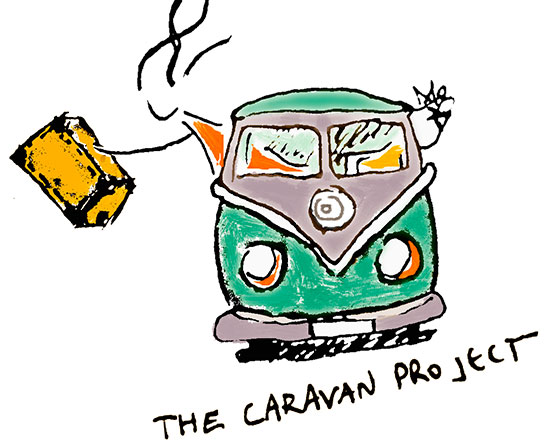
Caravan PojectAnother world is here For the last three years a team of artists and researchers has been travelling all around Greece in a motorhome at the most difficult point in its modern history. With documentary, writing, narration and photography as vehicles the team highlights human stories that have the power to awaken, to motivate and create spaces for reflection and metapraxis. In the turbulent times we live in, the broadcasting od personal stories is a revolutionary practice that increases our resistance and twirls again our longing for life, thus bringing us to the core of human existence. The caravan project is a moving cultural platform, a small ark of human testimonies named 'Another World Is Here', though which human history and its positive effect on the human psyche are celebrated. Through cultural and educational activities in cities, swuares and villages, universities and schools, prisons and vulnerable groups the project communicates the stories it has produced, inaugurating a new kind of creative dialogue and realizing in the difficult period that we are going though our deep need for participation and interaction. In the auditorium of this year's biennale the action of the caravan project will be presented through photos, texts, documentary material while chatting with the audience for the importance of stories in times of crisis. Part of the caravan project is the collection of narratives. By asking 'tell me a story that you like to tell often' they collect stories of people they meet creating a mosaic of stories. Involving the public in a more interactive relationship with the creators, the caravan will address the same question: 'tell me a story that you like to tell often' and it will record record stories, connecting people who watch with the base of their own untold stories.
The storrytelling that the caravan project brings to life seeks through the healing and unifying power of stories to break exclusions, to bring people together, to contribute creatively in a necessary dialogue to renegotiate the principles that bring us closer to a more substantial form of 'welfare'. Tuesday, 19/11, 19:00–20:30, 8–10 Sofokleous |

OPSIS
Antonis Pittas, Wednesday, 20/11, 17:00-18:00,
The 4th Athens Biennale activates the artworks of the exhibition with the participation of the public. A series of meetings among public, curators and artists will take place in front of particular works aiming to an interpretational approach. An analysis of the relations among works, artistic practices will emerge through dialogue, while their connections to the thematics of this year's Biennale will also be discussed. |
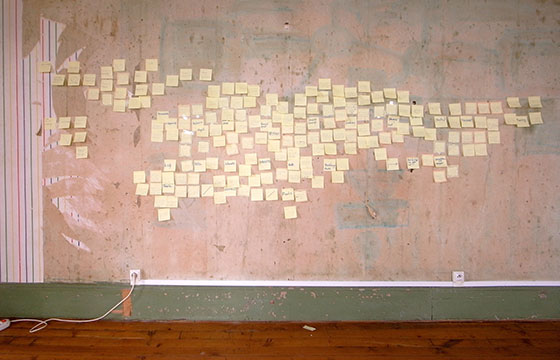
Marialena MaroudaWalking in the City – a Workshop on the Poetics of Space The workshop Walking in the City – a Workshop on the Poetics of Space consists of walking through Athens according to specific guidelines and with a stack of post–its in hand as a notebook. More specifically, the walk consists of observing and noting those movements and thoughts that are so familiar while walking in Athens that they usually go unnoticed: like passing by an open window and listening to the sound of TV coming from the inside (on a summer's night), stepping on a paving slab that is broken or unstable or slippery from the rain that makes you lose your balance, the instantaneous transformation of a shop window into a mirror. After the walk, the notebook is disassembled and the post–its are used to create the 'Map of Walking Poetics', a map thatis at once a trace of an ephemeral action and an archive of bodily perceptions. Thursday, 21/11, 17:00–19:00, 8–10 Sofokleous st. |

Erect like a countrysymposium ERECTION POLITICAL, PHILOSOPHICAL, ARCHITECTURAL, SACRED, ARTISTIC AND POETICA homage to Dimitris Dimitriadis, author of Dying like a country. An initiative of Barbara Polla
Taking contemporary art as its backdrop, this symposium raises the question of the connections between erection and world-view. Erection is understood here as the primary manifestation of desire, joy and fertility; as a sacred event; as conquest and pride – extending even to a whole country. This question inevitably led us to the premonitory text by Dimitris Dimitriadis, Dying like s Country (1978), in which the author depicts a country where women have ceased to conceive children, where soldiers have laid down their arms and deserted, an ingrowing country where even the language is dying. A country plagued by the lack of any kind of stimulation. The organizers took this iconic text and reversed the paradigm to present an inversion, hence the title Erect like a Country. In the light of this inversion, erection is presented as an antithesis to death. The importance for Europe's future of desire, of attraction to others and of erection as a symbol will be discussed by speakers and participants at the symposium.
Speakers:
At the end of the symposium Maria Efstathiadi will introduce Dimitris Dimitriadis and his work. A recent, unpublished writing of Dimitris Dimitriadis, Lycaon, An Apology for Desire will be read, and Yannis Houvardas will direct a performance based on that text. The symposium also prefigures two exhibitions on the same theme, to be held in Greece in 2014. Symposium Program
12:30 Arrival, coffee
SESSION 1 – Art, Politics and Society
SESSION 2 – Philosophy and architecture
SESSION 3 – Homage to Dimitris Dimitriadis |
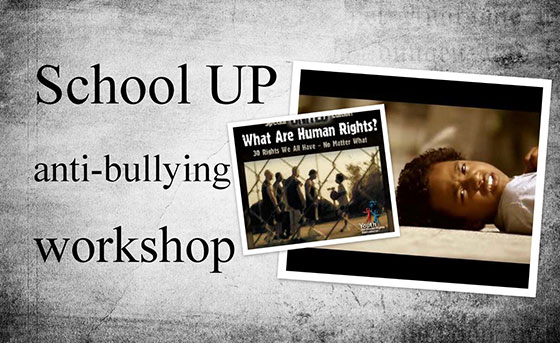
School UPworkshop School UP is a global initiative which aims to connect and help build bridges between students, teachers, and individuals around the world to collaborate and actively participate in developing a global consciousness and a more responsible global citizenship in the classroom and in society. School UP promotes Global Education as a tool to foster a culture of tolerance and understanding as well as the 'living together' spirit. School Up uses non–formal education in organizing workshops/activities to raise awareness about crucial values to help build a better world for all. School UP will organize at the 4th Athens Biennale a workshop to address the issue of bullying inside and outside of school. 'UNITED', an award-winning human rights music video will be played, which has inspired children around the world. A brief discussion will be conducted about the story it tells and an activity will also take place inviting the children to share their message. For children 6-12 years. The workshop will be conducted both in Greek and English.Saturday, 23/11, 10:30–11:30, 8–10 Sofokleous st. |

Katerina ZaharopoulouIn Agora (x) 4
Can an interview stand outside the media context? What is an on the road interview, apart from a reportage or opinion poll? How much can an everyday person, a person who lives, works or does not work in this contradictory city, penetrate the context of art and its structures? To what extent can artists dynamically infiltrate society? What exactly do they want to indicate with their images? Can we bring to the Athens Biennale people who do not know about it, people who simply do not know how to approach it? Is the relatively new trend in art for structures borrowed from other activities, like lectures, teaching etc., capable to involve the world inside and outside of it? Saturday, 23/11, 12:00–14:00, Ermou st. |
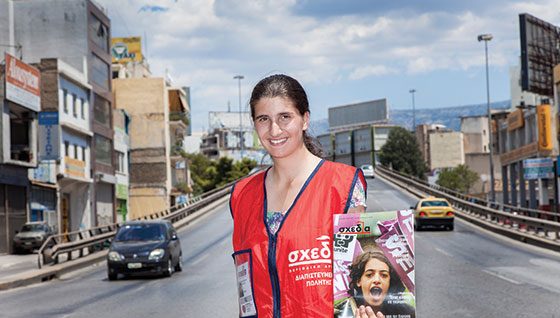
Schedia magazinepresentation
Schedia is an independent magazine that is sold on the streets of Athens offering the homeless, unemployed, and those living below the threshold of poverty an opportunity to decently earn a living, as well as an additional motive to restore their lives. Of the magazine cover price (3.00 euros), 50% (i.e. 1.50 euro) is directly received by the vendor. As is the case with all street magazines around the world, schedia is sold exclusively by accredited vendors at central points in the city. Saturday, 23/11, 16:00–18:00, 8-10 Sofokleous st. |

VALUELocating value, Presentation of the CHOROtAXIA Team
Producing value in visual arts
Unforgiving Measurements (happening)
The Chair of the Guard (visual arts project)
PATOSSI, MARPISSA, AUGUST 2013 (visual arts project)
Appropriation: Contemporary Art and Tradition (visual arts project) Are the different aspects of value (economic, moral, aesthetic etc.) connected to each other and if so in what ways? Is the present situation experienced as a multilayered "crisis of values"? How does the "market" redefine today the value of life along with the value of things? The VALUE workshop proposes a two months' collaboration of visual artists, social scientists, and theorists from different fields, who will take the anthropological perspective on "exchange" as a point of reference, while attempting to comprehend and comment on the ways value is created and experienced in everyday life. Visitors to the 2013 Athens Biennale are invited to participate in the weekly meetings, in the discussions and production of artistic work by the workshop's curatorial team, as well as by invited artists and theorists. The workshop's program can be found online at valueab4.wordpress.com. Coordination: Elpida Rikou (social anthropology / visual arts).
Saturday, 23/11, 17:00–20:00, 8–10 Sofokleous st. (Machine room) |
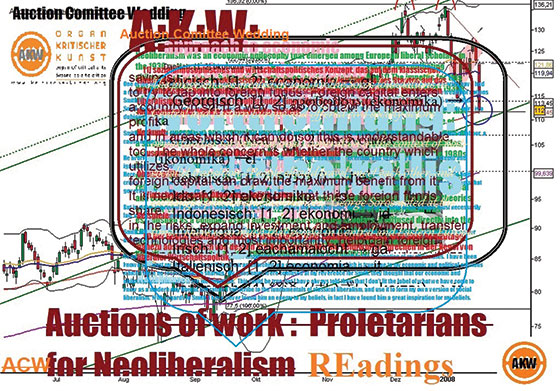
OKK AktionsgruppeAuktions Komittee Wedding / Auction Committee Wedding
OKK Aktionsgruppe is a Berlin-based collective working on the border of art and activism. In AGORA they present the performance Auktions Komittee Wedding / Auction Committee Wedding, an 'auction for paid work'. People can join in a competitive underbidding, as AKW auctions offer the chance to the audience to read neoliberal political and economic theory for money. Bidding starts at the minimum wages in 20 (out of 27) European countries that have implemented minimum wages 9 euros (France) to 2.40 euros per hour (Czech Republic). Saturday, 23/11, 18:00–19:30, 8–10 Sofokleous st. |
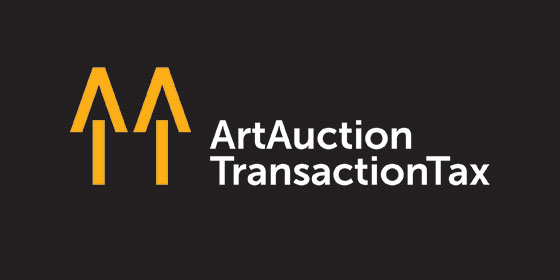
Neil CummingsArt Auction Transaction Tax (AATT)
Neil Cummings is a professor at Chelsea College of Art and Design in London, a member of Critical Practice, of the editorial board of Documents of Contemporary Art and of the campaign for an Art Auction Transaction Tax (AATT). The campaign is inspired by the Art Workers Coalition (AWC) in the 1960s, the activism of Liberate Tate in London, Occupy Economics and Stephen Wright's ideas of user-ship. As he says, the campaign 'aims to micro-tax the auction convened secondary market for contemporary art, and use the revenues raised to support the primary sites of art; education initiatives, not-for-profit organizations, and public institutions that nurture emerging art practices'. Saturday, 23/11, 19:30–20:30, 8–10 Sofokleous st. |

Nightshiftmusic Νightshift are Theo Zioutos and as11. They create live on stage musical soundscapes suing computers and virtual or not instruments. Their music can be characterizes as electronic, it is based on the styles of live electronics of concrete music and is influenced by the aesthetics of ambient and minimalism. Nightshift were formed in Septemver 2004, and since then they have participated in festivals in Greece (Electrograph, Synch, 2:13, Babel), live performances (Mikro Mousiko Theatro, KnotArts), they have released two albums '1904ΕP' (December 2004 – phase records) and 'Nightshift' (January 2005 – antifrost) and they have created the soundtrack for various cultural events. Theo Zioutos: The avant–garde legend of the city Theo Zioutos studding music and programming. Since 1996 he teaches Music Technology. He works with modern composition (electronic – electro – experimental) and improvisation using synthesizers, computers, as well as natural instruments. He has created or participated in various ensembles (Archery Target, Madder, Epsilon 11, Postblue, Lost Bodies). He has played in concerts and recordings of free improvisation with Greek and international musicians (David Grubbs, Nikos Veliotis, Jerome Noetinger, Christoph Irmer, Martin Kuchen, Antonis Livieratos, Alekos Christidis, Dimitris Kamarotos, Sotiris Debonos, Vasilis Papavasiliou, Blaine Reininger, Kostis Drygianakis, Bohman Brothers, Apostolos Souglakos etc.) He has worked as a music supervisor for theater performances of DiPeThe Volos and he has composed music for 20 theater plays. as11: Conceptualist as11 molests sound mediums since 2000. His discography includes 6 projects, τα '00:00" (CD) (2000), 5,000NWR (3" CD) (2001) 'New CD out Now!' (3" CD) (2002), 'Monotheism' (CD) (2006) (Antifrost), 'Pneumatik' (CDR) (2007) (Echomusic) and 'Altare' (CDR) (2009) (Absurd), and now he uploads his sounds on soundcloud. At the ELECTROGRAPH 02 festival he participated with the installation 'Monotheism' and in the exhibition suburbia organized by a-station in 2002 with '18′'. as11 has appeared live at the ELECTROGRAPH 01, 03, ELECTROGRAPH JAPAN 04 festivals, online with Great International Audio Streming Orchestra in 2005 and at the 2nd SHOWCASE OF EXPERIMENTAL SOUND of [un]common sounds in Arteleku, San Sebastian, Spain in November 2006. Saturday, 23/11, 21:00–22:00, 8–10 Sofokleous st. |

Gene Ray
Creative Alternatives to the state of bunkruptcy
A panel discussion on three specific 'creative alternatives to the state of bankruptcy' that highlight subjectivation processes and 'timely attitudes'. A discussion of propositions about commoning, permaculture and history 'from below' in collaboration with Iain Boal, London-based social historian of science & technology and activist historian of commoning, as well as catalyst of the Retort collective. Sunday, 24/11, 16:00–17:30, 8–10 Sofokleous st. |
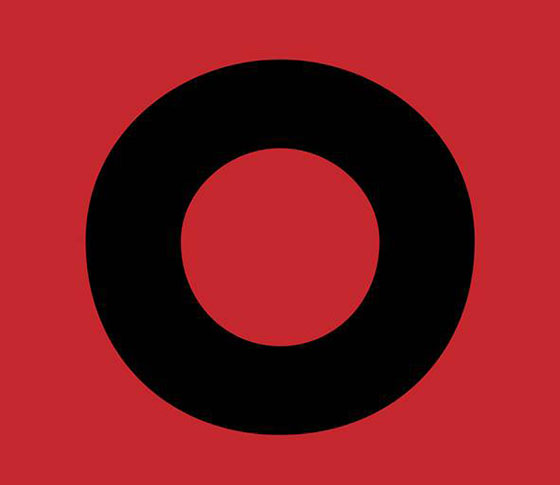
AGORA – KYKLOSStorytelling / Internet Kyklos is a series of loosely structured and pluralistic approaches on crucial issues that take place in AGORA Every Sunday afternoon. Invited to Kyklos, the teams and initiatives that actively touch these subjects will have 10-15 minutes in order to share their practical approaches as answers to the question Now what? On Sunday, 24 November, after the postponement of the previous meeting of Kyklos, the thematics Storytelling and Internet will be discussed back to back. Sunday , 24/11, 18:00–20:00, 8–10 Sofokleous st. |
The program of the eighth week of AGORA is as follows:TUESDAY 19/1117:00 – 19:00 Zafos Xagoraris, L' Ecran Noir: Peppermint Frappe, screening, 8–10 Sofokleous (Machine room)18:30 – 21:00 Areti Miggou, Polyphonic Songs from Epirus, workshop-music, 8–10 Sofokleous (Machine room) 19:00 – 20:30 Caravan Project, Another world is here, presentation, 8–10 Sofokleous st. |
WEDNESDAY 13/1117:00 – 21:00 Zafos Xagoraris, L' Ecran Noir: Je t' aime, je t' aime, screening, 8–10 Sofokleous st. (Machine room)17:00 – 18:00 OPSIS, Antonis Pittas, presentation, 8-10 Sofokleous st. |
THURSDAY 14/1117:00 – 19:00 Marialena Marouda, Walking in the City – a Workshop on the Poetics of Space, workshop, 8–10 Sofokleous st. (Machine room)14:00-16:00 Zafos Xagoraris, L' Ecran Noir: The Girl on a Motorcycle, screening, 8–10 Sofokleous st. |
FRIDAY 15/11all day, Erect like a country, symposium, all day, 8–10 Sofokleous st.17:00-19:00, Walking in the City – a Workshop on the Poetics of Space, workshop, 8–10 Sofokleous st. (Machine room) |
SATURDAY 16/1110:30–12:30 School Up, children's workshop, 8-10 Sofokleous st.12:00–14:00 Katerina Zaharopoulou, In Agora x 4, performance, Ermou st. 16:00–16:00 Zafos Xagoraris, L' Ecran Noir: Petulia, screening, 8–10 Sofokleous st. 17:00–18:00 OPSIS, Constantinos Hadzinikolaou and Petros Touloudis, 8–10 Sofokleous st. 16:00–18:00 shedia, presentation, 8–10 Sofokleous st. 17:00–20:00 Value Workshop, 8–10 Sofokleous st. (Machine room) 18:00–19:30 ΟΚΚ, Auktions Komittee Wedding / Auction Committee Wedding, performance, 8–10 Sofokleous st. 19:30–20:30 Neil Cummings, Art Auction Transaction Tax (AATT), presentation, 8–10 Sofokleous st. 21:00–22:00 Nightshift, music, 8–10 Sofokleous st. |
SUNDAY 24/1114:00–16:00 Zafos Xagoraris, L' Ecran Noir: Anna Karenina, screening, 8–10 Sofokleous st.15:00–18:00 OPSIS, Chrysanthi Koumianaki, 8–10 Sofokleous st. 16:00–17:30 Gene Ray, Creative alternatives to the state of bankruptcy, panel discussion, 8–10 Sofokleous st. 17:00–18:00 OPSIS, Sam Durant, 8–10 Sofokleous st. 18:00–20:00 ΚΥΚΛΟΣ, Storytelling / Internet, 8–10 Sofokleous st. |
4th ATHENS BIENNALE 2013 AGORANational Bank of Greece Building, 8–10 Sofokleous str.CAMP Contemporary Art Meeting Point, 4 Eupolidos & 2 Apellou str. 29th September – 1st December 2013 |
OPENING HOURSNational Bank of Greece Building, 8–10 Sofokleous str.CAMP Contemporary Art Meeting Point, 4 Eupolidos & 2 Apellou str. Tuesday–Friday: 13.00–21.00 Saturday & Sunday: 10.00–22.00 |
ADMISSIONAGORA offers a season ticket for the exhibition for 8 euros. The season ticket allows admission throughout the two months of the 4th Athens Biennale and for all the events hosted by the AGORA. Additionally, AGORA offers a daily ticket for 5 euros and a discount ticket for 3 euros, for students who hold a student ID, teens 12–18 years old and senior citizens (70 years old or above). Holders of the Manpower Employment Organization q(OAED) card, students of the Athens School of Fine Arts, members of the Chamber of Fine Arts of Greece, ICOM, AICA, IKT as well as special needs attendants are granted free entrance with appropriate ID. |
| For high resolution photographs, please visit the PRESS page of the AGORA webpage and the AGORA Facebook , Twitter, Instagram, Pinterest, Tumblr, YouTube, Vimeo pages. |
|
For more information please contact: Katerina Stavroula, Press Officer T: 0030 210 52 32 222, 210 52 32 224, Email: press@athensbiennial.org |
 |
|
<< Previous: 4th Athens Biennale 2013 AGORA WEEK 7 |
| Archive Index | |
Athens Biennale
Subscribe to Athens Biennale: